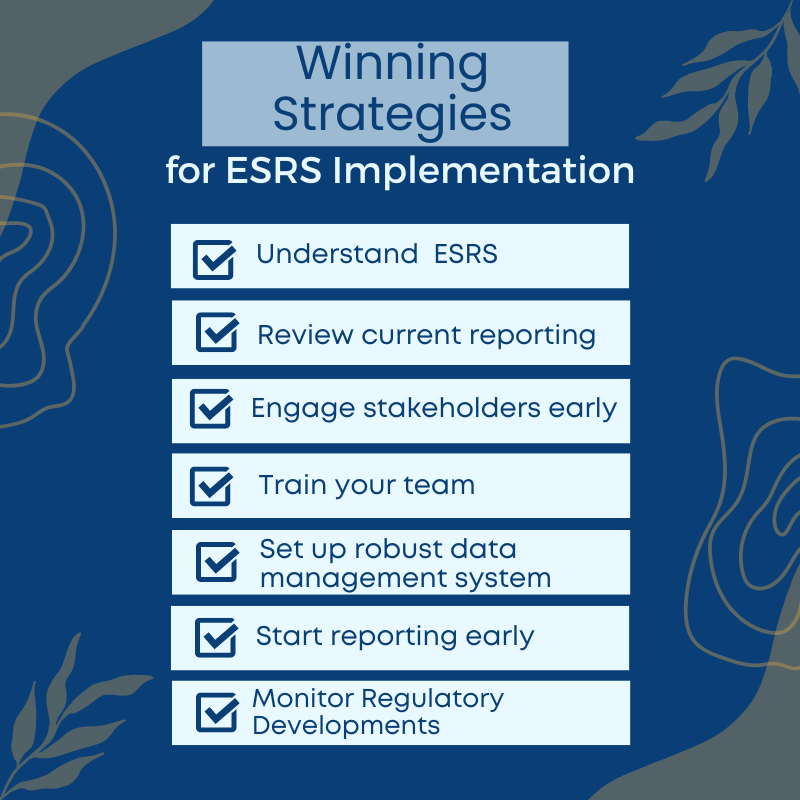As global awareness of environmental, social, and governance (ESG) issues continues to rise, regulatory bodies are formulating new rules to support the transition towards sustainable business practices. One such regulation is the Corporate Sustainability Reporting Directive (CSRD). This critical piece of legislation forms an essential part of the European Commission’s agenda to build a sustainable economy. However, its implementation poses several challenges. In this blog, we’ll shed light on these challenges and provide insights on how to overcome them, empowering your business with sustainable practices.
What Does the CSRD Implementation Entail?
The Corporate Sustainability Reporting Directive (CSRD) is an EU regulation set to enhance corporate sustainability reporting among companies operating in the European Union. Starting from 2024, large companies with more than 250 employees and listed SMEs are required to report on sustainability matters in alignment with stringent disclosure requirements. The CSRD directive will apply to large companies with more than 500 employees from 2025, irrespective of their listing status. This new CSRD regulation dictates the use of standardized sustainability reporting standards, demanding both qualitative and quantitative disclosures. Companies must present reports detailing their principal actual or potential impact on areas like climate risks and social and environmental issues. The CSRD requires the validity and accuracy of the implemented data to be audited. The European Commission will adopt measures to enhance the digitization and accessibility of the sustainability information provided. The CSRD is designed to ensure companies adopt a more sustainable approach to their operations, offering stakeholders enhanced transparency regarding sustainability matters.
Which Organizations Will Be Impacted by the CSRD?
The CSRD, or Corporate Sustainability Reporting Directive, will affect a broad range of organizations within the EU. Starting from 2024, companies subject to the CSRD will need to comply with these new requirements. The estimate is that approximately 50,000 companies fall within these categories. The CSRD aims to improve the transparency of sustainability practices within European businesses and foster responsible corporate behavior. Consequently, organizations that are not yet compliant will need to adjust their reporting processes to ensure they are providing accurate and comprehensive information about their environmental, social, and governance impact. Non-compliance could lead to reputational damage and potential legal consequences. Overall, the CSRD will have far-reaching implications, prompting organizations to prioritize sustainability and accountability within their operations.
To learn more about the implementation timelines for different groups of companies, check this blog: Demystifying CSRD: Timelines For Companies
Wondering about the potential consequences of not complying with the CSRD? Take a look at this blog: CSRD Non Compliance: The Consequences of Not Complying
How to Identify CSRD Reporting Topics?
As a reporter for the CSRD, several factors need to be considered when determining what to report on. First, the concept of double materiality should be considered, referring to a company’s environmental and social practices impact on both its financial performance and the wider societal context. This means CSRD reports should cover not only financial performance but also the company’s impact on people and the environment. In addition, the needs of stakeholders such as investors, customers, employees, and the broader community should be factored in when deciding what to report. Mandatory disclosures also determine the topics to be covered in a CSRD report, including ESRS 2: General Disclosures, ESRS E1: Climate Change, and ESRS S1: Own Workforce. By considering these factors, a CSRD reporting organization can decide which topics to cover that will provide the most valuable sustainability information to stakeholders, thereby promoting sustainability and corporate responsibility.
What are the European Sustainability Reporting Standards?
The European Sustainability Reporting Standards (ESRS) are guidelines introduced by the EU to ensure companies operating within Europe report on their sustainability practices, offering a clear overview of their performance. These standards, also known as the ESRS, form part of the EU’s larger effort to enhance corporate transparency and accountability regarding Environmental, Social, and Governance (ESG) issues. The new CSRD directive will replace the current Non-Financial Reporting Directive (NFRD), requiring companies to implement the ESRS to demonstrate compliance with the CSRD. The European Financial Reporting Advisory Group (EFRAG) is responsible for developing the ESRS in line with the materiality principle, requiring companies to disclose sustainability information that could impact business practices and decisions. The accountability of the information provided in the reports is ensured through external audit by an independent assurance service provider.
How Does ESRS Relate to CSRD?
The ESRS, or European Sustainability Reporting Standards, directly relate to and complement the CSRD. In November 2022, the first set of draft ESRS was published as a sustainability reporting framework for large companies subject to the CSRD. The CSRD aims to unify, simplify, and improve sustainability reporting across the EU, and the ESRS is crucial in achieving this objective. The ESRS will provide a common framework and language for sustainability reporting, making it easier for investors, stakeholders, and other interested parties to compare and evaluate different companies’ sustainability performance. The ESRS will outline key sustainability indicators, provide guidance on reporting principles, and establish a common process for assurance to ensure the credibility and reliability of reported data. Overall, implementing the ESRS will help companies enhance their sustainability strategies and contribute to a more sustainable future for Europe and also, importantly, help companies to demonstrate compliance with the CSRD.
What is the Impact of ESRS on Companies?
The implementation of the European Sustainability Reporting Standards (ESRS) will have a significant impact on companies operating in the EU. The ESRS requires companies to report on their social and environmental impact, in addition to their financial performance. The framework includes a double materiality assessment, considering the company’s impact on the planet and on society. Mandatory disclosures will increase accountability and transparency, which are vital for building stakeholder trust. Investors and creditors are becoming increasingly aware of a company’s operations’ impact on the environment and society.
Overall, the ESRS will enhance the credibility and reliability of sustainability reporting and encourage companies to integrate environmental, social, and governance (ESG) considerations into their business strategies.
To find out more about the implications of ESRS, check our blog The Implications of the European Sustainability Reporting Standards (ESRS) for Businesses
EU CSRD Implementation Challenges
The implementation of CSRD presents numerous challenges for companies, especially those that are new to sustainability reporting. Below are some of the major hurdles that companies may encounter:

1. Data Gathering and Verification
A significant challenge is the sourcing and verification of sustainability data. CSRD requires comprehensive, reliable, and consistent information across various domains, which may be difficult to collate for some companies. Ensuring data quality and accuracy is paramount, as erroneous data can lead to misleading reports, reputational damage, and potential regulatory penalties.
2. Limited Expertise and Resources
Not all companies have the expertise or resources to deal with the extensive reporting requirements of the CSRD. This task is especially daunting for smaller businesses or those just beginning their sustainability journey. These companies may lack the necessary staff, knowledge, or systems to effectively compile and report the required data.
3. Aligning with Other Reporting Frameworks
Many companies already report on sustainability measures in accordance with different frameworks such as the Global Reporting Initiative (GRI) or the Sustainability Accounting Standards Board (SASB). Aligning these existing practices with the new requirements of the CSRD could be complex and time-consuming.
4. Changes in Internal Processes
Implementing the CSRD often necessitates changes in internal business processes. For instance, companies need to establish new data collection and reporting methods, which can be disruptive and necessitate extensive change management initiatives.
Overcoming the Challenges

Despite these hurdles, companies can take several steps to facilitate CSRD implementation:
1. Leveraging Technology
Companies can use data management software and other digital solutions to automate and streamline the process of data gathering and reporting. Leveraging technology can also help to ensure data accuracy and consistency, making it easier to meet the CSRD’s stringent data requirements.
2. Building Capacity
Investing in training and capacity building can provide staff with the knowledge and skills necessary to meet CSRD requirements. Companies may also consider hiring additional staff or outsourcing certain tasks to consultancies specializing in sustainability reporting.
3. Implementing a Standardized Reporting Framework
A standardized reporting framework can streamline the process of aligning the CSRD with other reporting obligations. For instance, the International Integrated Reporting Council (IIRC) offers a globally recognized framework that covers many of the CSRD’s requirements, which companies can adopt to facilitate the alignment process.
4. Establishing Robust Internal Processes
By establishing robust internal processes, companies can ensure the effective and timely collection and reporting of data. Change management initiatives may be required to minimize disruption and facilitate the smooth transition to new procedures.
Conclusion
The implementation of the CSRD presents significant challenges. However, with careful planning and strategic investment, companies can overcome these hurdles and fully comply with the new directive. By doing so, they will not only avoid regulatory penalties but also enhance their corporate reputation, gain a competitive advantage, and contribute to the broader goal of building a more sustainable economy. Remember, the journey towards corporate sustainability is a marathon, not a sprint. By approaching it systematically and strategically, your business can overcome any obstacle and achieve long-term success.
Your Next Step on the CSRD Compliance Journey
Are you ready to spearhead your company’s sustainability journey and stand out from the crowd? The Corporate Sustainability Reporting Directive (CSRD) and European Sustainability Reporting Standards (ESRS) are not only coming but are here, and your next steps are critical.
Mastering the complexities of the CSRD and ESRS can seem like a daunting task. However, overcoming this challenge doesn’t just mean compliance with new laws – it’s an opportunity to show your commitment to a sustainable future, to gain a competitive edge, and to attract stakeholders who value responsibility.
We know it might be overwhelming, but you’re not alone in this journey. Imagine having all the necessary tools, knowledge, and support at your fingertips. That’s where The CSRD Compass steps in. We’re your ultimate guide to everything CSRD and ESRS, offering a rich collection of resources ranging from detailed guides and insightful articles to comprehensive courses and expert analysis. Navigating this new terrain of sustainability reporting has never been easier!
Don’t wait for tomorrow. The time to act is now. Embark on your sustainability reporting journey today, prepare your business for a sustainable future and make a real impact on our planet. Visit The CSRD Compass today, and let’s shape a greener future together!


